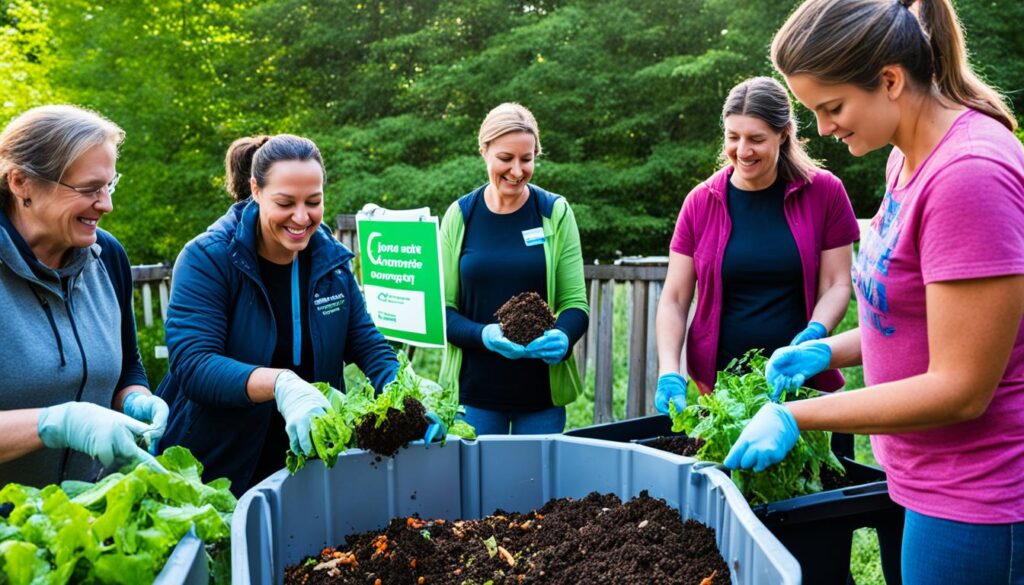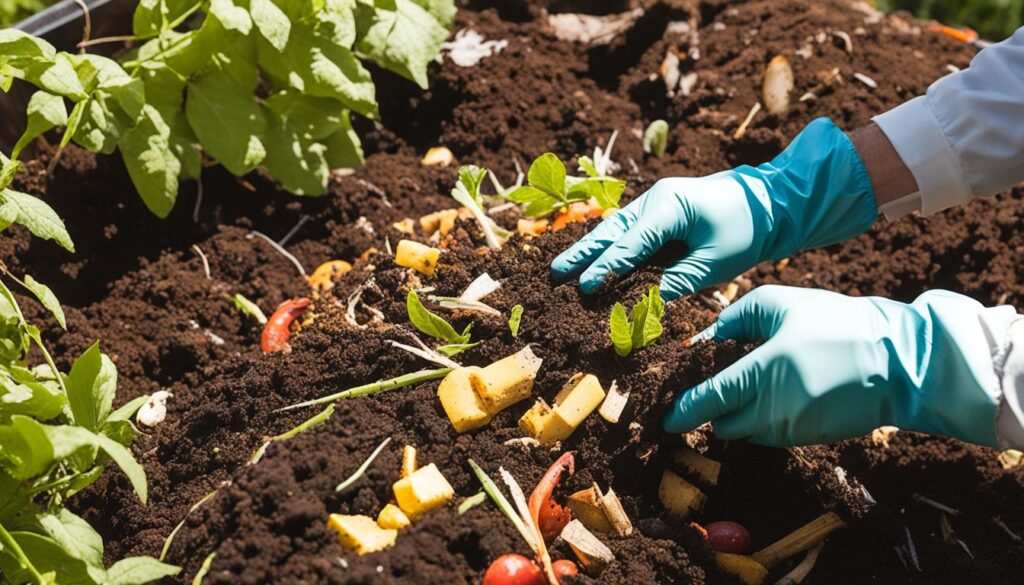Welcome to the world of composting, where turning organic waste into nutrient-rich soil is not only beneficial for your garden but also great for the environment. Composting is an eco-friendly way to manage your organic waste while reducing your carbon footprint and landfill waste. By composting, you can contribute to a more sustainable lifestyle and create a positive impact on the planet.
Key Takeaways:
- Composting is an eco-friendly way to reduce waste and enrich the soil.
- It helps divert organic materials from landfills, reducing methane emissions.
- Composting saves money by eliminating the need for expensive chemical fertilizers.
- It improves soil quality, leading to healthier plants and vegetables.
- Attending local composting classes can provide valuable hands-on education.
The Basics of Composting
To begin composting, you need to understand the basics. Combine carbon-rich matter (browns) like dead leaves with nitrogen-rich organics (greens) like grass clippings in the right ratio.
There are different types of composting methods you can use, such as bin containers, vermicomposting, bokashi, and even commercial or community composting.
Collect kitchen items like tea bags, coffee grounds, and fruit or veggie scraps and store them in a sealable container until you’re ready to add them to your compost pile.
To speed up the composting process, maintain the right ratio of materials and turn the pile to introduce oxygen.
However, it’s important to avoid composting meat, fish, bones, dairy products, oil, pet manures, glossy paper, weed seeds, or diseased plants.
Local Composting Classes
If you’re new to composting and want to learn more, consider attending local composting classes. These classes cover the basics of composting and provide hands-on education. One example is the composting basics class at the Fayette County Extension office on April 21st. To register for upcoming classes or to get more information about composting, you can contact the Fayette County Extension office. These classes are a great opportunity to learn from experts and gain practical knowledge about composting.

Upcoming Composting Classes
| Date | Time | Location |
|---|---|---|
| April 21, 2022 | 10:00 AM – 12:00 PM | Fayette County Extension Office |
| May 5, 2022 | 2:00 PM – 4:00 PM | Community Center |
| June 10, 2022 | 9:30 AM – 11:30 AM | City Hall |
Attending these classes will equip you with the knowledge and skills to start composting effectively. You’ll learn the proper techniques, ratios, and tips to create nutrient-rich compost for your garden. Additionally, you’ll have the chance to connect with like-minded individuals and foster a sense of community around composting.
Don’t miss out on the opportunity to expand your composting education. Join a local composting class today and take the first step towards sustainable waste management and a greener future.
Benefits of Composting
Composting offers numerous benefits, not only for your garden but also for the environment. By diverting organic materials from landfills, composting helps to reduce waste and minimize the release of harmful methane gas into the atmosphere.
Environmental Benefits:
- Reduces waste and landfill usage
- Decreases greenhouse gas emissions
- Promotes a more sustainable way of living
Composting also offers financial advantages. By creating your own nutrient-rich soil, you can eliminate the need for expensive fertilizers and reduce overall gardening expenses.
Gardening and Soil Benefits:
- Improves soil structure and water-holding capacity
- Enhances soil fertility and nutrient availability
- Promotes healthier plant growth and increased crop yields
By composting your organic waste, you can contribute to waste reduction efforts and play an active role in preserving the environment. Composting is a simple and effective way to lower your carbon footprint while generating valuable resources for your garden.
“Composting is nature’s way of recycling. By composting, we mimic the natural decomposition process and transform waste into a valuable resource for our gardens and the environment.”
How to Get Started with Composting
If you’re new to composting, getting started can seem overwhelming. However, it’s actually quite simple. Follow these steps to begin your composting journey:
- Choose a location: Select a well-drained spot that receives plenty of sunlight for your compost pile.
- Pick a compost bin: Decide whether you want to use a purchased bin or opt for a DIY option that suits your needs.
- Add browns and greens: Create layers in your compost pile by adding carbon-rich matter (browns) and nitrogen-rich organics (greens).
- Maintain moisture levels: Keep the pile moist but not too wet. This will help with the decomposition process.
- Turn the pile regularly: Introduce oxygen by turning the pile, which helps speed up the composting process.
- Monitor temperature: Make sure the temperature of the pile stays between 120-160 degrees Fahrenheit for efficient decomposition.
- Adjust materials: If necessary, add more browns or greens to achieve the right balance in your compost pile.
By following these simple tips, you can easily get started with composting and contribute to a more sustainable lifestyle.
Note: Remember to avoid composting meat, fish, dairy products, glossy or coated paper, diseased plants, and synthetic materials. These items should not be included in your compost pile as they can attract pests, create odors, or contaminate the compost.
What to Compost and What to Avoid
When it comes to composting, knowing which materials to include and which to exclude is key to successful and efficient composting. By composting the right ingredients and avoiding non-compostable materials, you can create nutrient-rich soil and avoid potential issues such as pests and odors.
Compostable Materials
Compostable materials are the essential components that contribute to the breakdown and enrichment of your compost pile. These materials include:
- Food scraps: Fruit and vegetable peels, coffee grounds, tea bags, and eggshells.
- Yard waste: Leaves, grass clippings, shrub trimmings, and small branches.
- Paper products: Shredded newspaper, cardboard, and paper towels (without any chemical residue).
- Cotton, wool, hair, and pet fur: These natural fibers decompose easily and add organic matter to your compost.
By incorporating these compostable materials into your compost pile, you are providing the necessary elements for the decomposition process and the creation of nutrient-rich soil.
Non-Compostable Materials
While many things can be composted, some materials should never be added to your compost pile. Avoid including the following non-compostable materials:
- Meat and fish: These items can attract unwanted pests and create odors.
- Dairy products: Milk, cheese, and yogurt should be kept out of the compost since they can spoil and lead to foul smells.
- Glossy or coated paper: Magazines, shiny cardboard, and plastic-coated materials do not break down easily and can contaminate the compost.
- Diseased plants: Avoid composting plants that are diseased or infested with pests to prevent the spread of pathogens.
- Synthetic materials: Plastics, rubber, and synthetic fabrics take a significantly long time to decompose and should be kept out of your compost pile.
By eliminating these non-compostable materials from your compost, you can maintain a clean and healthy composting environment.
| Compostable Materials | Non-Compostable Materials |
|---|---|
| Food scraps | Meat and fish |
| Yard waste | Dairy products |
| Paper products | Glossy or coated paper |
| Cotton, wool, hair, and pet fur | Diseased plants |
| Synthetic materials |
Maintaining Your Compost Pile
Maintaining your compost pile is crucial to ensure successful composting. By following a few simple tips and tricks, you can troubleshoot any issues that arise and keep your compost pile thriving.
Monitor Moisture Levels
It’s important to keep your compost pile moist, but not too wet. Excess moisture can lead to a smelly, anaerobic pile, while dry conditions can slow down decomposition. A good rule of thumb is to aim for a damp sponge-like consistency. If the pile feels too dry, simply add some water; if it feels too wet, add more dry carbon-rich materials like leaves or straw.
Turn Your Compost Pile
Regularly turning your compost pile is key to maintaining airflow and promoting decomposition. Turning the pile mixes the materials, ensuring even breakdown and preventing the pile from becoming compacted. Use a pitchfork or compost thermometer to check the internal temperature and simply give the pile a good mix with the help of a garden fork or shovel. Aim to turn your pile at least once a week.
Check the Temperature
The temperature of your compost pile is an indicator of its health and progress. Ideally, the pile should reach temperatures between 120-160 degrees Fahrenheit, as this range accelerates the breakdown of organic matter. Monitor the temperature regularly by inserting a compost thermometer into the center of the pile. If the temperature is too low, consider adding more nitrogen-rich greens to activate the decomposition process.
Troubleshooting Common Issues
If you notice any signs of odor or imbalance in your compost pile, it’s important to address the issue promptly. Foul smells can indicate anaerobic conditions, so ensure the pile is well-aerated by turning it more frequently. Unpleasant odors can also be caused by an excess of nitrogen-rich materials, so adjust the ratio of browns to greens accordingly. If the compost pile attracts pests, bury food scraps deeper or cover them with a layer of brown materials to deter unwanted visitors.

By following these composting tips and tricks, you can maintain a healthy and productive compost pile. Remember, composting is an ongoing process, so be patient and persistent. With time and proper care, you’ll have nutrient-rich compost to enhance your garden and contribute to a more sustainable lifestyle.
Conclusion
Composting is a cool and eco-friendly way to manage your organic waste. By composting, you can reduce waste, save money, improve soil quality, and minimize your carbon footprint. It’s a win-win for both your garden and the environment!
To incorporate composting into your sustainable lifestyle, it’s important to start with the basics. Understand the composting process and find the right composting method that suits your needs. Attend local composting classes to gain hands-on education and learn from experts in the field.
Maintaining your compost pile is key to successful composting. Keep the pile moist, turn it regularly to introduce oxygen, and monitor the temperature for efficient decomposition. By following these simple steps, you can create nutrient-rich soil that nourishes your plants and contributes to a healthier planet.
So why wait? Start composting today and make a positive impact on the environment. Composting is not only beneficial for your garden, but it’s also a sustainable way to manage organic waste. Join the composting movement and be a part of the solution. Composting is cool!
FAQ
What are the benefits of composting?
Composting offers numerous benefits, including waste reduction, cost savings, improved soil quality, and reduced carbon footprint.
How do I start composting?
To start composting, choose a location for your compost pile, select a compost bin, and add layers of browns (carbon-rich matter) and greens (nitrogen-rich organics). Then, maintain the pile by turning it regularly and monitoring the moisture and temperature levels.
Where can I learn more about composting?
You can learn more about composting by attending local composting classes, such as the composting basics class at the Fayette County Extension office on April 21st. These classes provide hands-on education and expert guidance.
What materials can I compost?
Compostable materials include food scraps, yard waste, paper products, cotton, wool, hair, and pet fur. These materials can break down and contribute to nutrient-rich soil.
What materials should I avoid composting?
Non-compostable materials that should be avoided include meat, fish, dairy products, glossy or coated paper, diseased plants, and synthetic materials. These materials can attract pests, create odors, or contaminate the compost.
How do I maintain my compost pile?
To maintain your compost pile, keep it moist but not too wet, regularly turn it to mix the materials and introduce air, and monitor the temperature and balance of the pile. Make adjustments as needed.